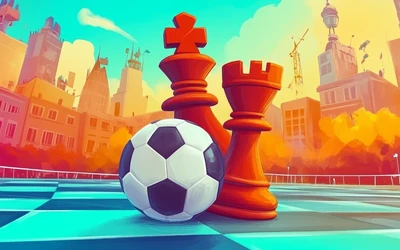
Image is AI generated
When should my child start playing chess?
In this article, we look at the top 10 chess players in the world (according to FiDE in January 2025) to see how old they were when they started playing chess. We do this to determine the ideal age at which to consider teaching a child chess.As parents, we all want our kids to develop important skills that will help them succeed in life, and chess is definitely one of those skills that can teach so much—strategic thinking, problem-solving, and patience, just to name a few. But when is the right time to start teaching your child how to play? I found myself staring at my 2-and-a-half-year-old, wondering if she’s ready to learn how to checkmate.
We know the benefits of chess: it builds analytical thinking, helps with focus, and even provides great opportunities for socialization, especially if your child joins a chess club. But still, when is the right time to introduce them to the game?
To answer this question, I decided to take a look at the world’s top chess players and see when they started. Here’s what I found:
- Magnus Carlsen – Age 5
- Fabiano Caruana – Age 5
- Hikaru Nakamura – Age 7
- Arjun Erigaisi – Age 3
- Gukesh D – Age 7
- Nodirbek Abdusattorov – Age 4
- Alireza Firouzja – Age 8
- Ian Nepomniachtchi – Age 4
- Wei Yi – Age 6
- Viswanathan Anand – Age 6
While some of these chess masters started as young as 3 years old, others began around age 8. On average, they started around 5.5 years old, which seems to be a sweet spot. At that age, kids have the attention span to focus and start understanding the basic rules and concepts of the game.
So, if you're wondering when to start teaching your child chess, the consensus seems to be around 5 years old. That’s when they’re ready to start developing a real interest in the game. It makes sense, right? At that age, they’re not only capable of learning the moves, but they’re also at an age where you can begin nurturing critical thinking and problem-solving skills in a fun way.
As parents, we want to give our kids every opportunity to thrive, and chess could definitely be one of those building blocks. So, if your little one isn’t quite ready yet, don’t worry—there’s plenty of time to start. But, if they’re showing interest, why not give it a go? Just keep it light and fun, and who knows—you might have the next chess prodigy on your hands!
You may also like
 ebk1976
ebk1976Ding-ness
What it is, why it occurs, and some ideas on how to snap out of it. FM MathiCasa
FM MathiCasaChess Football: A Fun and Creative Variant
Where chess pieces become "players" and the traditional chessboard turns into a soccer field Jedidiah932
Jedidiah932Who gave the pawn permission to promote?
In this article, we will explore the life of the pawn on the chessboard and how it parallels your HU… Jedidiah932
Jedidiah932The Chess Improvement Formula: Study + Analysis = Mastery
Improving at chess isn't just about grinding games or memorizing moves. It’s a deliberate process th… ebk1976
ebk1976